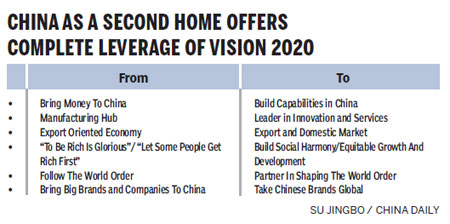Multinationals need to take stock
Updated: 2012-02-24 10:43
By Saurabh Sharma (China Daily European Weekly)
|
|||||||||||
 |
Many of those doing business in china need to see the bigger picture and partner host country
Imeet many expats in China who keep grumbling about one thing or the other here. Yet, in the past many years, none of them have left China. Why?
Perhaps they like it here but they are not sure if they should like it here; they hate it here but they are not sure if they should hate it here. This is, may be, because they have not clearly, or have very narrowly, articulated what they really want from China.
 |
The situation is not very different for some of the multinational corporations (MNCs) in China. They are lost between their fundamental distrust of China and their acute desire to make the best of this market opportunity.
For MNCs to be able to chart a long-term growth path in China, this attitude has to change. As a first step in this direction, MNCs need to know very clearly what they want from China. Also, MNCs need to step back and reflect on China's journey of transformation in the past 30 years of reforms and its future development.
China is transforming rapidly and is busy creating what I call "China 1.2".
China 1.2 is a new kind of modern society in the making. In this wider context, China of the future would like MNCs to play a more constructive role in developing China 1.2 and partnering it to gain global reach.
MNCs need to ask themselves how to address this expectation and opportunity. This question is also linked with the kind of industry that the MNC is operational in. The imperatives for MNCs operating in non-strategic consumer industries are not the same as those which are operating in technology-intensive strategic industries.
Depending on the nature of industry an MNC operates in, I see two paradigms for MNC engagement in China.
1. China as a market paradigm
2. China as a second home paradigm
Allow me to explain.
1. China as a market: A transactional view
Most MNCs have traditionally been adopting this approach in China. This paradigm offers a canvas for collaborative partnership between China and MNCs but is limited to the creation of the domestic market and exports. It relies heavily on public relations and public affairs strategies to bring out MNCs' commitment to China. It includes adapting the MNC messaging and the annual or five-year business targets to fit the long-term and short-term government announcements and plans. This paradigm, though, is ideally suited to MNCs that are operational in non-strategic sectors such as consumer products but it misses the bigger opportunity that China offers.
Also, this approach was suitable for China 1.0 - the China of the past 30 years of reforms.
As China's needs change, so would its aspirations and resulting expectations from MNCs. Thus "China as a market paradigm" needs to be updated and adapted to keep in step with a changing China.
The past 30 years of rapid development has given the Chinese economy global stature and influence; it is no longer just an emerging market or a developing economy. Today China is simultaneously the world's second-largest economy and an emerging market. It has widespread influence in countries spread across almost the globe.
In keeping with the size, scale, influence and potential of the Chinese economy, China of today is poised to be the home country of many Chinese MNCs that would have a stake in global markets.
China as a market paradigm misses this global potential of China. It falls short because it makes MNCs think in a way where they treat China as another subset of its global operations instead of a hub that can give greater reach in other emerging markets.
MNCs entering and operating in China need a new perspective to frame the China of tomorrow. This new China requires MNCs to have a new mental map. Only then will they be able to comprehend its full scope and scale and find their own gainful position in it. In order to think this way, MNCs perhaps need a new way of looking at China - first as a country, then as a society and then as a market.
To view China this way, MNCs need to understand the principle behind China, for China beyond just using it as a public relations and public affairs watchword.
To be successful, MNCs need to take a hard look at how they can serve China's long-term interests. Only this can help them build a long-term working partnership with the country.
What will MNCs need to do to be able to think this way? What changes are needed in the way MNCs view their business and their origins today?
2. China as a second home: A transformational view
This new paradigm is especially relevant for MNCs engaged in China's strategic industries such as energy, information technology, financial services, electronics, aviation and aerospace.
This paradigm allows two benefits:
1. Strategic localization and development of products and services suited to China
2. Strategic global reach in other emerging markets through low-cost solutions developed in and with China
Together these two lead to MNCs' "strategic insideration" in China.
China as a second home offers a wide canvas for the collaborative partnership between China and MNCs across all the aspects of Vision 2020. (See table below).
Some companies are already deploying their learning. Siemens China is a case in point. The company proudly states that it wants to make China its second home.
The size and growth potential of the China market, the rare opportunity to apply pioneering technologies, and the great government relationship that the company has enjoyed in the country, gives it the confidence that its China venture is more than just an international office. It is its home in the eastern hemisphere that gives it greater reach into the rest of the world. In 2008 the company completed the construction of its 29-story headquarters in Beijing, built at a cost of 1 billion yuan (120 million euros). Today Siemens has over 90 operating companies and more than 60 regional offices in China that collectively employ more than 41,000 employees - 99 percent of whom are Chinese mainlanders.
GE is another company bullish on China. The US company is going full-throttle in China. The company has announced multiple strategic partnerships in China - a 50-50 joint venture with Wuhan NARI Co. Ltd (owned by China's State Grid Corporation) to produce and sell energy-grid monitoring and diagnostic products. The company is also jointly acquiring, with State Grid's Shanghai Electric Power Co, a controlling stake in Shanghai Tianling Switchgear Co, a power-distribution equipment maker. GE has also signed an agreement to form an equally owned joint venture with Chengdu Locomotive & Rolling Stock Works, which is owned by China South Locomotive and Rolling Stock Corporation, to develop new propulsion systems. Finally the company also entered into a 50-50 joint venture with the Beijing National Railway Research & Design Institute of Signal & Communication to supply railway-signaling systems for the local and international markets. GE's success, because of its openness to JVs is not a new phenomenon.
Many MNCs have long collaborated with State-owned enterprises to create stronger business positions than they could have achieved on their own. Cummins is an equal partner both in production and R&D with Dong Feng Motor as its largest customer in China. This has allowed the company to develop products faster in China than it would have otherwise managed to and also helped it strike more relationships and partnerships with other customers such as mass-transit operators in China. All this has helped Cummins' non-China operations to export four times the value of products to China because it exports from China too.
Any outsider who wants to participate in China must be realistic about the time frame. No part of the process will be instantaneous. Successful efforts take a long time. MNCs must organize for decades, build a base for the future, and become not just a branch factory for the home operation, but in many ways a Chinese company. Patience and long-term vision pay off well in China. After 150 years of turbulent history China is moving toward a stronger and more stable economic system, through partnerships and co-creation. MNCs can not only win in China tomorrow but also be able to enhance and spread their own competitiveness across the globe in ways never before imagined .
The author is Planning Partner, Ogilvy & Mather, China. The views do not necessarily reflect those of China Daily.
Today's Top News
Rescuers race against time for quake victims
Telecom workers restore links
Coal mine blast kills 18 in Jilin
Intl scholarship puts China on the map
More bird flu patients discharged
Gold loses sheen, but still a safe bet
US 'turns blind eye to human rights'
Telecom workers restore links
Hot Topics
Lunar probe , China growth forecasts, Emission rules get tougher, China seen through 'colored lens', International board,
Editor's Picks

|

|

|

|

|

|





